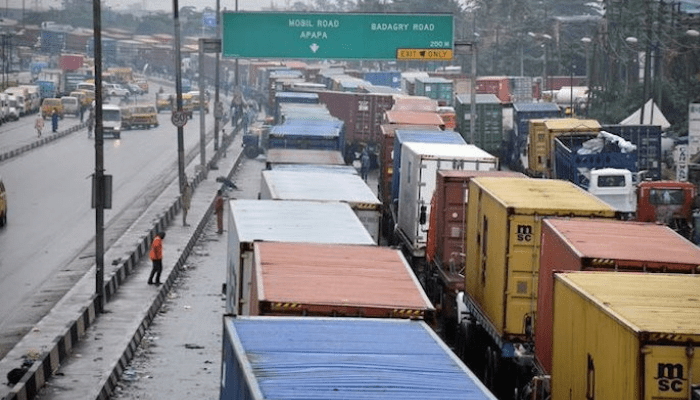Truckers, Importers and Exporters have continued to count their losses as the continued closure of the Marine Bridge, Apapa for repair cripples port operations.
LEADERSHIP reports that the continued closure of the bridge has paralysed cargo movement, leading to prolonged delays and wastages and, thus, worsening operational challenges across the port corridor.
Maritime experts have lamented that the continued closure of the bridge has resulted in multi-million naira loss for the economy, prolonged delivery times, and heightened operational challenges.
Speaking to Journalists, the national secretary of the National Association of Road Transport Owners (NARTO), Aloga Ogbogo, said that while the closure of the bridge might be necessary for maintenance and rehabilitation, it had created a chain of economic and logistic setbacks for operators and businesses relying on the route.
According to him, each closure of the bridge without a viable alternative route significantly increases journey time, fuel consumption, and exposure of drivers to harassment, extortion, and even brutalisation along alternative routes.
Ogbogo noted that such delays ultimately affect the entire value chain. Goods expected at specific times fail to arrive as scheduled, disrupting production and trading activities for both exporters and local distributors.
The NARTO chieftain described the frequency of repairs as alarming, calling on the Federal Ministry of Works to take proactive steps in providing a permanent solution rather than resorting to repeated temporary fixes.
He emphasised that the excessive tonnage and deadweight of trucks plying the bridge daily have placed immense structural stress on it.
He identified poor planning and over-dependence on road transport as root causes of the recurring crisis, stressing the urgent need for a practical and functional railway system to reduce pressure on the bridge and the Apapa corridor.
Ogbogo further pointed out that the government’s enforcement of axle load limits has been selective, focusing mainly on tanker trucks. At the same time, other categories of vehicles—including cement and industrial goods carriers often exceed safe weight limits.
“If the bridge is being closed down, it is for maintenance and rehabilitation. But I would also assume that an alternative route would have been provided. That means longer journey time, more fuel consumption, and harassment from security forces.
This slows down cargo movement and delays delivery to the final destination.“The railways should be made functional. The Apapa-Ibadan rail line should be effectively used to move cargo. Some of these deadweight goods can be transported by rail to nearby cities to ease the load on the bridge and roads,” Ogbodo said.
Also speaking, an exporter and chief executive officer of Hallmark Investment, Alhaji Nofiu Inaolaji, lamented that the incessant closure of the Marine Bridge has continued to take a heavy toll on port users and businesses.
Speaking on the impact of the incessant bridge repairs, Inaolaji stated that while the bridge shutdowns directly disrupt truckers’ activities, exporters and importers ultimately bear the financial burden, as the cost of delays, demurrage, and prolonged logistics challenges is transferred to them.
He expressed disappointment that despite several appeals and recommendations made by stakeholders in the maritime and logistics sector over the years, little to no action has been taken to address the root cause of the recurring bridge closures.
Inaolaji noted that the continuous disruptions caused by the closure of the Marine Bridge have far-reaching effects on Nigeria’s port operations, trade efficiency, and overall economic productivity. He urged the government to implement a sustainable and long-term solution to the recurring infrastructure problem, warning that the current situation threatens ease of doing business in the maritime industry.





